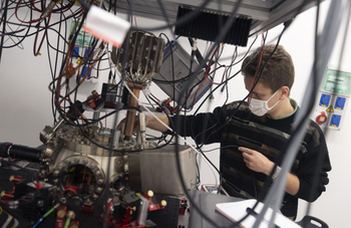Complex quantum information development launched with the contribution of ELTE
At the Quantum Information National Laboratory, nearly twenty internationally renowned research groups are collaborating to place Hungary at the forefront of research in quantum computing and quantum physics. The following primary goals of the project – which has already achieved outstanding results – include building up a domestic quantum communication network, physically implementing the basic building blocks of quantum informatics, and establishing a pool of experts who can create and perform cutting-edge simulations in the fields of quantum systems and quantum computing.
The development of information technology has fundamentally transformed our lives in recent decades, and this process is still forging ahead. Another breakthrough of fundamental importance is within arm’s reach, the starting point of which is that we are already using quantum technology in physical systems to process, store, and transfer data. By exploiting quantum superposition and quantum entanglement, special phenomena in quantum physics, as novel resources, a qualitative change may be achieved in communication, computing, and information technologies. This step
opens up revolutionary new opportunities for the society and economy,
which is why it earned itself the name “second quantum revolution”.
The second quantum revolution equally represents an intellectual, technical, economic, and social challenge for Hungary and requires close cooperation on the part of leading domestic researchers and engineers in this field. In Hungarian research institutes and universities, nearly twenty internationally renowned research groups are working on projects related to quantum computing. The Quantum Information National Laboratory, established in 2020, brings together the domestic resources of physicists, engineers, mathematicians, and computer scientists, whose activities can be further focused on certain rapidly emerging areas of quantum technology in the theoretical and applied fields. With thoughtful and coordinated developments in the framework of the National Laboratory, the role and importance of our country can be maximised on the broad horizon of quantum informatics unfolding at present.
On 1 October 2022, the joint project of the Wigner Research Centre for Physics, the Budapest University of Technology and Economics, and Eötvös Loránd University, entitled “Complex Development of the Quantum Information National Laboratory” was granted the green light. Following the completion of the preparatory steps that are currently in progress, substantive research and development work can soon begin. The project is supported by the National Research, Development and Innovation Office with HUF 3.475 billion over the next three years under the funding scheme “Establishment and Complex Development of National Laboratories” (code number: 2022-2.1.1-NL).
In addition to almost eighty experienced researchers, the project is implemented with the participation of fifty Ph.D. and sixty Master’s students.
The Quantum Information National Laboratory has set itself three strategic goals for the coming three years, which are the following:
- The establishment of a quantum communication network
Establishing a regional quantum communication network that will be joined to the “quantum internet” planned by the European Union. - The physical implementation of the basic building blocks of quantum information science
Developing the hardware components based on photons, atoms, and artificial atoms required for quantum computing operations and maintaining an internationally cutting-edge laboratory background to facilitate this. - Quantum computing and the simulation of quantum systems
Creating a pool of domestic experts with profound knowledge in quantum computing who are able to operate quantum computers belonging to a vast infrastructure as users.

